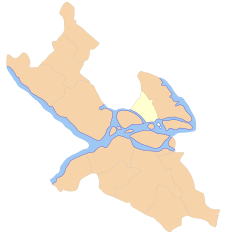Norrmalm (okręg administracyjny)
| ||||
| ||||
 Kungsgatan | ||||
| Państwo | ||||
| Region | Sztokholm | |||
| Miasto | Sztokholm | |||
| Powierzchnia | 5,67 km² | |||
| Populacja (2014) • liczba ludności | 69 592 | |||
| • gęstość | 14 148 os./km² | |||
Położenie na mapie Sztokholmu | ||||
| Strona internetowa | ||||
| Portal | ||||
Norrmalm – okręg administracyjny (stadsdelsområde) w ramach gminy Sztokholm, położony w jej centralnej części (Innerstaden).
Według danych opublikowanych przez gminę Sztokholm, 31 grudnia 2014 r. stadsdelsområde Norrmalm liczył 69 592 mieszkańców, obejmując następujące dzielnice (stadsdel)[1][2]:
- Norrmalm
- Skeppsholmen
- Vasastaden
oraz Roslagstull, część dzielnicy (stadsdel) Östermalm.
Powierzchnia wynosi łącznie 5,67 km², z czego wody stanowią 0,75 km²[3].
Przypisy
- ↑ Stockholms stad: Områdesfakta. Norrmalm (szw.). [dostęp 2015-11-17].
- ↑ Stockholms stad: Norrmalm (szw.). [dostęp 2015-11-17].
- ↑ Stockholms stad: Areal och befolkningstäthet i stadsdelsområden, SDN-delar och stadsdelar 2014-12-31. Stockholm (szw.). [dostęp 2015-11-17].
Linki zewnętrzne
| ||||||||||
Media użyte na tej stronie
Autor: Alex Nordstrom, Jniemenmaa, Licencja: CC BY-SA 2.5
The borough (stadsdelsområde) of Norrmalm of the municipality of Stockholm, Sweden as of 2007.
Autor: Holger.Ellgaard, Licencja: CC BY-SA 3.0
Kungsgatan i Stockholm västerut med Malmskillnadsbron i bakgrunden, vy från Regeringsgatans bro.
Autor: Koyos, Licencja: CC BY-SA 2.5
This coat of arms was drawn based on its blazon which – being a written description – is free from copyright. Any illustration conforming with the blazon of the arms is considered to be heraldically correct. Thus several different artistic interpretations of the same coat of arms can exist. The design officially used by the armiger is likely protected by copyright, in which case it cannot be used here.
Individual representations of a coat of arms, drawn from a blazon, may have a copyright belonging to the artist, but are not necessarily derivative works.




